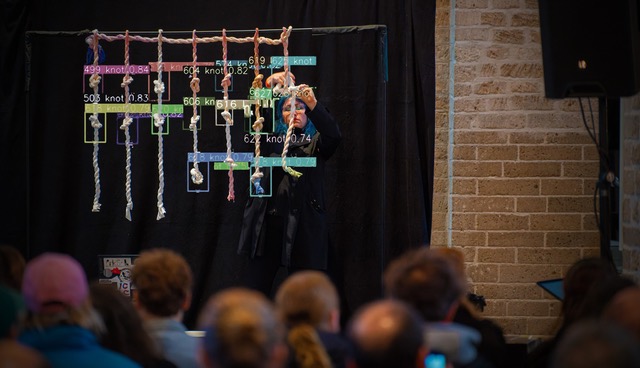KhipuKoding by Paola Torres Nunez del PradoArts KeynotePerformance
KhipuKoding
The talk will consist of a live coding performance KhipuKoding, followed by a presentation + Q&A. Currently planned for the evening of March 12th 2024 from 18h-20h.
About KhipuKoding
This hybrid Live Coding act is thought around the khipu (fiber-based notation device of pre-Hispanic origin), and is constantly in development. The KhipuKoding system consists of hanging textile ropes that are tied following a notation method inspired in the actual values given by the Incan method. A computer running a Machine Learning + Computer Vision model (Yolo5) trained to recognize knots then associates their position to numbers (in the Incan manner) and that, in turn, runs or modifies a line of code in the FoxDot (Supercollider) environment in order to generate sound.
Growing up in Peru, the khipu was taught as part of my identity, build up onto a grandiose past, now long gone. As such, I knew about such device early in life, and it shaped my understanding of code and tactility. The Neokhipukamayok Manifesto recognizes a line of sound researchers and visual artists that have referenced such device in their practices, and discusses its implications.
KhipuKoding 2.0 + The Neokhipukamayok Manifesto is a Sound Performance thought around the khipu (fiber-based notation device of pre-Hispanic origin) that combines Machine Learning, Computer Vision, the human act of knotting, and a hybrid notation method that reads khipu-style knots in order to generate sound.

About the talk
The current referencing of khipus in the arts, fiber-based tactile coding devices of pre-Columbian origin, represents a fascinating convergence of traditional Andean practices with contemporary artistic movements. This fusion not only underscores the syncretic nature of cultural exchange and artistic innovation but also intersects with themes central to computer science and its history, particularly in programming. By incorporating khipus into media art, Paola Torres Núñez del Prado engages with concepts of human-computer interaction and programming, reflecting a broader trend within the arts that explores the relationship between ancient weaving techniques and modern computational processes, highlighting the multicultural origins of computer systems, challenging Eurocentric narratives of technological progress. By tracing the lineage of algorithms, this historical reclamation not only emphasizes the importance of recognizing diverse intellectual traditions but also sheds light on alternative modes of programming.
Transdisciplinary artist and researcher that explores the boundaries and connections in between tactility, visual and sound related to the human voice, to nature and to the synthetic, such as machine noises or the digital. She is a pioneer in the development of D.I.Y. textile controllers as sound interfaces and coding systems, which she has played in demos and in performances since 2007. She departs from complex thinking (complex systems) where the inquiring of the connections and limits of the senses becomes a way to examine concepts such as interpretation, translation and misrepresentation, reflecting on mediated sensory experiences while questioning cultural hegemony within the history of Technology and the Arts. She has received the Stockholms stads kulturstipendium 2022 and the Prix Ars Electronica 2021 Honorary Mention, the Artists + Machine Intelligence Grant from Google Arts and Culture and Google AI in 2020 and was the winner of the "Local Media: Amazonian Ecoregion: Vivo Arte.mov competition in Brazil, 2013. Her works are part of the collections of the Swedish Public Art Agency and the Malmo City Museum.
Tue 12 MarDisplayed time zone: Amsterdam, Berlin, Bern, Rome, Stockholm, Vienna change
19:30 - 20:30 | |||
19:30 60mTalk | KhipuKoding by Paola Torres Nunez del PradoArts KeynotePerformance Arts Paola Torres Núñez del Prado Stockholm University of the Arts | ||
